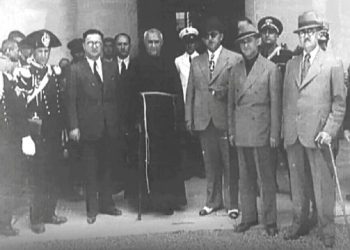From Bashkim Trenova
Part twenty-two
MYTH-MYSTICISM, VICTIMOMANIA, RACISM AND SERBONOSTALGIA
ALBANIANS ACCORDING TO THE SERBS
(THE EASTERN CRISIS AND THE BALKAN WARS)
Memorie.al / “Serbs are descended from the Slavs, a large number of tribes who gave life to the Slavic peoples. Knowledge about the origins of the history of the Slavs is modest and not so clear. Their name appears for the first time in the 6th century AD, when Byzantine writers start talking about the Slavs….”! (Dushan Bataković, Milan St. Protic, Nikola Samardžić, Aleksandër Fotic. History of the Serbian People. L’Age d’Homme. Lausanne. 2005. Pg. 3.)
Continues from last issue
Should we heed the government’s peace-loving calls? If there is anything compromised in the Balkans, first of all these are the official statements of the Balkan governments. Their love of truth has been discredited enough.
Hundreds and thousands of our soldiers were sacrificed, who left their bones in the impassable mountains of Albania… The Serbian people paid for the madness of their leaders with the blood and lives of their best sons. (2)
—
We must not lie. The extraordinary measures and dragonian organization of the new provinces make it difficult for a calm and cultured development. They simultaneously strengthen the positions of groups and cliques, which have brought many evils and misfortunes to the Serbian people. They undermine the foundation of what lays the greatest strength of a people: the foundation of democracy and culture. They set us back and burden us with new and greater deprivations.
1 – Dimitrije Tucovic. Sabrana came out. (Selected works). Book 7. Pg. 72–75.
2 – Right there. Pg. 136-137.
The government is aided and pushed into adventures by unconscious representatives of the bourgeois press, who after every battle of our army bought a dozen shares and for whom the end of the war interrupted this patriotic profession. (1)
—
It should not be forgotten that the border with the Albanians should not be guarded by our regiments, but a better and more cultured policy towards the Albanians, our simple soldier follows the press and it strongly influences him, he is powerless to free himself from this influence when, as has been observed, especially in these wars, the press cunningly deceives it in order to prepare it for something which the owners need at the time. In order to carry out this last mobilization, the press has preached revenge against the Albanians, making them guilty. In some cases, the soldiers have behaved towards the Arnaut population according to the opinion that the articles of the Belgrade newspapers have created among them. (2)
—
That Arnaut belt that covered the old Serbian border from Mitrovica to Vranje has been completely exterminated. Grave silence reigns in Kosovo. Only here and there does a vindictive rifle crackle, which, as one of the most prominent functionaries in these areas once assured me, was caused by the “non-tactical” attitude of our authorities. (3)
—
Even the surroundings of Gjakova are almost entirely patched up… Around Gjakova there are very few Serbian settlements: in this whole area, Serbia has found the place of Serbs, medieval Serbian monuments, cold walls, which do not protect border posts, which are valuable for the archaeologist and the artist, such as Decani. These may stir the soul of nationalist romantics, but they do not speak of anything that would justify the establishment of the new regime in these provinces. And precisely the main reason for all the disasters from which we suffer today and will suffer in the future, lies in the fact that we have entered a foreign land.
Thus, Gjakova, this center of the strongest corruption, nest of the Kachaks, with its economic life gives a completely different picture of the Albanians than what the Belgrade newspapers give on purpose or out of ignorance. From here we must note that we are dealing with a people, towards whom the Serbian chauvinists are committing injustice, denying them the ability for cultured work and, at the same time, for a peaceful life.
1 – Dimitrije Tucevic. Sabrana came out. (Selected works). Book 7. Pg. 143.
2 – Right there. Pg. 145.
3 – Right there. Pg. 163.
—
The invading policy of the Serbian government towards the Albanian people has created such relations that it is difficult to expect peace and normalcy in the near future. (3)
—
If the Austrian rulers’ concern for the rights of all Balkan nationalities for national self-determination is a terrible mockery of the principle of nationalities, Serbia’s claims to occupy Albania are a serious and flagrant violation of this principle. By announcing this policy, the Serbian bourgeoisie now removed for the first time from the face of the Serbian people, the veil of an oppressed nation fighting for its liberation. Even among our bourgeoisie, the memories of the former boyish ideals of freedom, equality and fraternity were erased and, along with them, the ability to appreciate the aspirations of other peoples for freedom disappeared. (1)
1 – Dimitrije Tucevic. Sabrana came out. (Selected works). Book 7. Pg. 203-205.
2 – Right there. Pg. 206-207.
3 – Dimitrije Tucovic. Sabrana came out. (Selected works). Book 8. Pg. 17.
4- Right there. Page 19.
—
The occupying attitude of Serbia towards the Albanian people… has shown especially how hatred between peoples is incited through politics. In the dangerous game of justifying a vicious policy, the bourgeois press has created for Albanians a whole fortress of wrong and tendentious thoughts. (2)
—
With a policy that did not take into account people, tribes, people and the natural aspiration for Albania to have its own independence, Serbia lost all contact with the representatives of the Albanian people, making them feel a deep hatred towards everything Serbian. . If the Albanian people have not yet formed a national whole, which could be prepared by a national opinion, this opinion today, unfortunately, exists in the general national revolt of the Albanian people against the barbaric acts of their neighbors, Serbia, Greece and Montenegro, in the revolt which is a big step towards the national awakening of the Albanians.
Serbia entered Albania as an enemy, and came out as an enemy. The boundless hostility of the Albanian people towards Serbia is the first positive result of the Albanian policy towards the Serbian government. It is necessary to at least now face the truth and, standing up against prejudices, to accept that the struggle that the Albanian race is fighting today is a natural, inevitable historical struggle for a political life different from the one it had under the Turks and from what his wild neighbors, Serbia, Greece and Montenegro, impose on him. The free Serbian people must appreciate and respect this war, as much for the sake of the freedom of the Albanians as for themselves, and remove from any government all the means for an expansionist policy.
1 – Dimitrije Tucovic. Sabrana came out. (Selected works). Book 8. Page 77.
2 – Right there. Pg. 106-107.
As the representative of the proletariat, which has never been a servant of the annexationist policy of the ruling classes, social democracy has the duty to follow step by step the exterminating policy of the rulers against the Albanians, to flog it as barbarism, which is carried out under the false pretext of ” the highest culture”, as a class policy of the bourgeoisie, which in the most harmful way speaks on behalf of the class interests of the proletariat, as an annexationist, anti-popular policy, which endangers the peace and freedom of the country and greatly burdens the position of the popular masses. (1)
—
Against this policy, social democracy emphasizes its motto: The political and economic community of all peoples in the Balkans, without excluding the Albanians, on the basis of democracy and complete equality. (2
The expedition against Albania is a crime against the principle of nationalities. The radical government gave two interpretations to this principle: when Austria kills Serbs in Hungary and Bosnia, this is a crime against the modern understanding of the principle of nationalities, while when Serbia tries to swallow Albania, there is nothing immoral here! (3)
—-
In Drenica, in the nest of Kosovar Albanians, the uprising broke out. With the last village burned and the last family killed in Drenica, the Albanian issue will be removed from the agenda for our public. The micro-bourgeoisie will go to sleep peacefully again. While the working man cannot be indifferent to these uprisings, he will seek their solution once and for all.
They cannot be extinguished by destroying crops, burning villages, exterminating the population. These uprisings will end when this policy, which is being followed today against the Albanians, is put an end to. The source of these uprisings is not the Albanians, but our rulers. (1)
1 – Dimitrije Tucovic. Sabrana dela. (Selected works). Book 8. Pg. 108-110.
2 – Right there. Pg. 110.
3 – Right there. Pg. 167.
—
Militaristic bourgeois Serbia has made a fatal historical mistake. She thought that she would go out into the Adriatic Sea if she oppressed the Albanians, instead of making them her own. We committed an attempted premeditated murder against an entire nation. We were caught and detained in this criminal act. Now we must suffer the punishment. It is terrible: mistrust, even hatred of a people, which we have here behind our wings, and moreover a part of which is in our territory, which we must take into account in any political combination. (2)
—
The regime in the new provinces and especially the relations with other nations, i.e. with the Albanians, must be put on a democratic, cultural and human basis of tolerance, life and joint work. This is the solution against the uprisings and not the bloody repressions that are carried out down there from Kosovo. (3)
—
The characteristic of all Balkan states is that they have big claims: they all want more than they can afford. All of them make big plans – but without material basis. Voltaire’s assertion that other people’s always like to talk about their past, the justifications in the most excellent way in the Balkan states, which on the foundations of the past wanted to fix their future. There is no Balkan state that has not been the master of the Balkan Peninsula. Some remember the empire of Dushan, others of Simeon or Sajmol, some think of the great Serbian state, others of Byzantine Bulgaria, etc.
1 – Dimitrije Tucovic. Sabrana came out. (Selected works). Book 8. Pg. 169-171.
2 – Right there. Page 71.
3 – Right there. Pg. 171-172.
The borders in the Balkans have always changed and only memories remain! The memory of that “glorious” past, coupled with the fervent desire of the ruling classes for territorial expansion, has made the Balkan countries armed to the teeth. Yes, we are very well equipped with lethal weapons. We bought a lot and a lot even. We bought where we could, we bought with cash when we had it, and then with debt! (1)
—
And so ended the First Balkan War. At this historical moment, the Balkan states had the opportunity to show not only whether or not they are able to preserve their victories, and whether they are able to forget their “glorious” past, but also to think about the demands of today. The small Balkan states could not forget the Simeons, Dushans, etc. and they could not stay in the real territory. It was the same with national freedom. The Balkans is populated by a large number of nations and only a free federal republic would be the only guarantee for complete national freedom. But, as we are seeing, the ruling classes showed that they are incapable of carrying out such a work. Instead of the general community of independent peoples of the Balkans, we have again enemy states with nationalities under the yoke. (2)
—
“With the aggressive policy of the Serbian government towards the Arbanians, such relations have been established on the western border of Serbia, that in the near future we can hardly expect peace and a stable situation […] our press, in a catastrophic race to help a disgustingly directed and executed policy, for months and years has spread tendentious thoughts about Arbanians, but we believe that the Serbian element was forced to retreat only because of Albanian pressure. Do you say that it is likely only once in history that the influx of a few better organized tribes will drive a people from its hearth? Are you saying that the Slavic tribes did not drive out the native inhabitants of these countries”? (2)
1 – Dimitrije Tucovic. Sabrana came out. (Selected works). Book 8. Pg. 182-183.
2 – Right there. Pg. 188-189.
“Even today, this is the only means by which the chauvinist press creates in the Serbian people the hatred towards the “savage” Arnauts, hiding like a viper the feet of savagery what the Serbian people have done to them. […] Balkanicus and dr. Vladan [Gjorgjevic) have written a whole book with a clear desire to suppress this miserable Arban people and to prove their incapacity for a cultured and national life. […] in order to prove that that people, as a race, has no sense of cultured and independent life; they present all that exists in the primitivism of that people not as an expression of the scale of history in which it finds itself and through which other peoples have also passed, but as an expression of its racial incapacity for cultural development in general.
Balkanicus’ zeal for underestimating the Arban people as a race goes as far as attributing the historical role of Skenderbeu to his origin from the Serbian Vojsava”. (1)
****
Dragan Popovic – University of Belgrade, Faculty of Philosophy, Department of History:
People did not wake up one morning as members of a people suddenly threatened by their brothers and neighbors. This was a process prepared for years by the elites (mainly scientific and cultural), but ultimately enabled by the state (and the party). People found themselves getting a single message from all sides. According to this message, a state based on equality was wrong and that the only acceptable solution, but also the only possible solution, is a unitary state, in which the Serbs are the ruling people. The Croats became a genocidal people who, since the end of the 18th century, work mainly for the destruction of the Serbs and Orthodoxy.
Bosniaks have become scoundrels, monsters, who have sold their faith for a dinner, so logically they do not have to believe. The Slovenians proved treacherous, although we welcomed them with bread and salt. Montenegrins and Macedonians are fictitious peoples, created only to weaken the “Serbian National Corps”. Again there was not much to say about the Albanians, they were seen as enemies with claims at the heart of the Serbian state. It is difficult to describe the force with which these theories were poured into the public and presented not as the most correct, but as absolutely the only ones.
1 – Dimitrije Tucovic [1914] 1980:17-44. Olivera Milasovic – Koha Ditore 28. 06. 2017.
2 – Dimitrije Tucovič: Srbija i Arbanija (Serbia and Albania), Rilindja, Pristina, 1968. Pg. 9-10.
The peoples of the Balkans developed according to historical circumstances, being defended and attacked, adapting to time and events, becoming actors of history as subjects, but also as objects. The empires moved them, or forced them to move, but they also moved themselves, escaping death, punishment, misery, hunger, disaster. Often they served the needs of powerful lords either as soldiers or as producers of goods, and it should not even be thought that these lords always had foreign names.
Religions fought over their “soul”, guided by their own very secular interests and inextricably linked to the aforementioned secular masters. People have mixed, combining experiences and traditions, but also preserving peculiarities, passing on the collective memory of previous generations through various forms of oral tradition. Of course, stories and myths have been created that can serve the current political moment, and some of them will be among the “founding myths” of new cultural and political communities – nations. Serbian nationalism is quickly and easily disguised as “integral Yugoslavia”.
Among the megalomaniac aims of Serbian nationalists, the idea of forming Yugoslavia as an enlarged Serbia was practically the pinnacle. This meant that the Serbian nation would occupy a much larger territory than the nationalists had ever dreamed of (all the territories inhabited by the South Slavs, and under the so-called “historical law”, also those inhabited by the others such as Albanians, Romanians, Germans, Italians, Turks or Hungarians) We will constantly have disasters and disasters if Serbia does not decide to change its policy. (1).
****
Dragisha Lapčevič – politician, journalist and historian:
I think that the policy of the Serbian government with the first expedition against the Albanians was wrong, harmful and unfortunate, both for the freedom of the Albanian people and for the peace and tranquility of the Serbian people. We must know well and agree on one thing: in the west of the Balkan Peninsula there is person that wants to live free. The government should not enslave Albania and subjugate the Albanian people.
For several centuries, the Albanians have lived with the Serbian people in a kind of community. In the declaration of war, this relationship is specifically mentioned and emphasized. In our recent history, we have examples of how Albanians have always wanted to live in understanding with Serbia, how both peoples have wanted to gain freedom from the Turks together. In 1806, in Bedenat of Belgrade, calls of attack were heard even in the Albanian language, she went there with a rifle and a cannon, so what was done was not only against the honor of a country, which once had traditions of revolution and liberation, but conditions were created for continued hostility between Albania and Serbia.
In the history of Shumadia, in its revolution, we find people of Albanian origin, who were genius revolutionaries, while Serbia in 1878 expelled and chased the Albanians from the 4 municipalities it took at that time. And finally, in 1912, the heads of the Albanian tribes come, have a meeting with the Serbian government, also with Pašić, and are ready to allow the penetration of the Serbian army, provided that Serbia makes it possible for them to free themselves from Turkey and gain their autonomy. The hopes and demands of the Albanians were betrayed.
Serbia, which had once fought so hard for its liberation, instead of doing everything on its part so that the Albanians also gain their freedom, sent its army to destroy through Albania, out into the Adriatic Sea, with the desire to bring the Albanian people to their knees and enslave them, she went there with rifles and cannons, so that not only was done what is against the honor of a country, which once had traditions of revolution and liberation, but they were created conditions for continued hostility between Albania and Serbia. Memorie.al
1 – Dragan Popovic. Ubijane yugoslavsne idea – personal perspective. (Killing the Yugoslav idea – a personal perspective).) Historiography-ba. 18.09.2021.




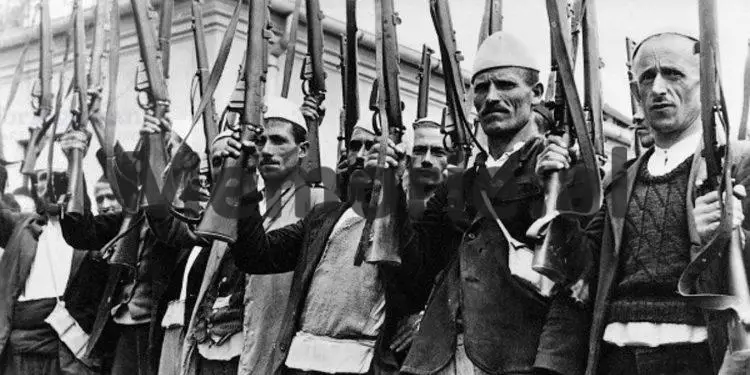
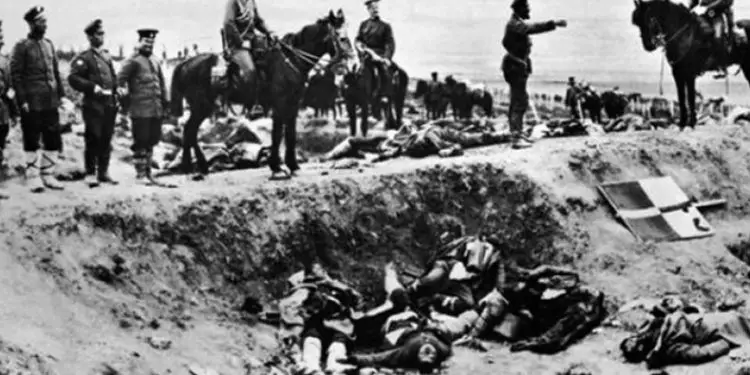
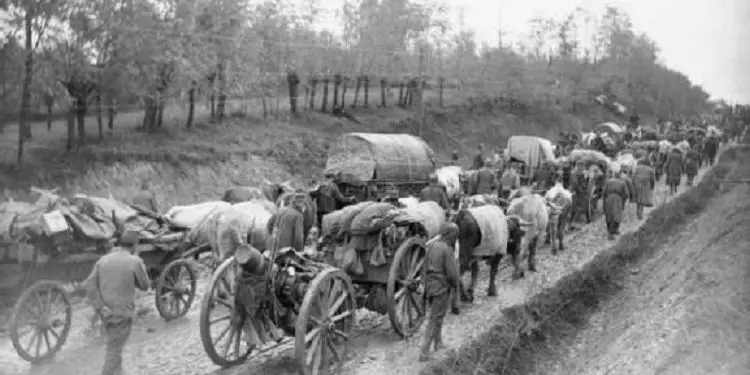
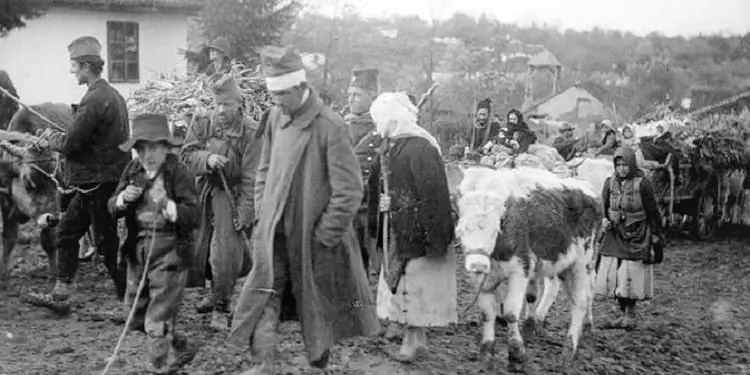
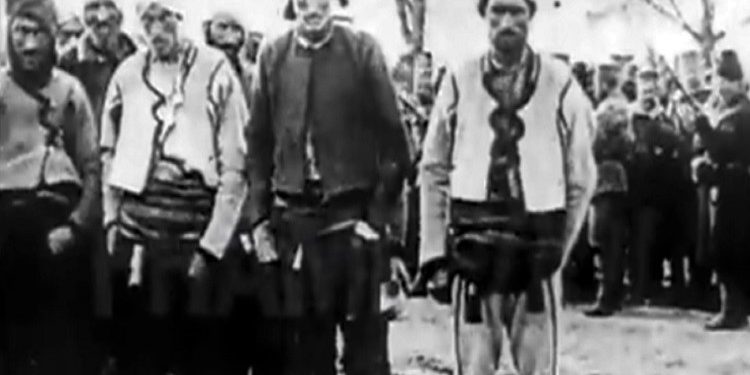

![“When the party secretary told me: ‘Why are you going to the city? Your comrades are harvesting wheat in the [voluntary] action, where the Party and Comrade Enver call them, while you wander about; they are fighting in Vietnam,’ I…”/ Reflections of the writer from Vlora.](https://memorie.al/wp-content/uploads/2025/06/admin-ajax-4-350x250.jpg)


